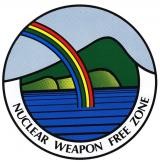In the Arctic, conflict and confrontation between the nuclear-armed States is increasing – partly as a result of the receding ice-cap resulting in new resource and territorial claims. This is leading to a flurry of legal claims and counterclaims regarding transit rights and ownership of valuable seabed resources. There is a growing possibility of serious disputes over these, leading to increased militarization and possibly even triggering armed conflict.
On 2 August 2008, for example, a Russian submarine planted their national flag on the seabed under the North Pole claiming it as part of the north Russian continental shelf. This provoked a stern rebuke from Canadian defense minister, Peter MacKay: "This isn't the 15th century. You can't go around the world and just plant flags and say: 'We're claiming this territory'." Canadian Prime Minister Harper followed a few days later by announcing plans to construct two new military facilities in the High Arctic region adjacent to the Northwest Passage sea route.
The US and Russia currently deploy nuclear weapons on strategic submarines that transit the Arctic waters. In addition, Russia maintains strategic naval bases in the region. These create some tension between these two nuclear powers.
Currently there is no regional forum for circumpolar nations to discuss and resolve conflicts and build cooperative security. The Arctic Council is specifically barred from dealing with security issues. An Arctic NWFZ could thus serve as a demilitarization and confidence building measure, and as a means to establish a regional forum to build cooperative security.
Basel Peace Office is working with the Danish and Canadian sections of PNND and Pugwash to advance the proposal for an Arctic NWFZ. It has already found support from the indigenous nations in the Arctic and from the government of Denmark.
